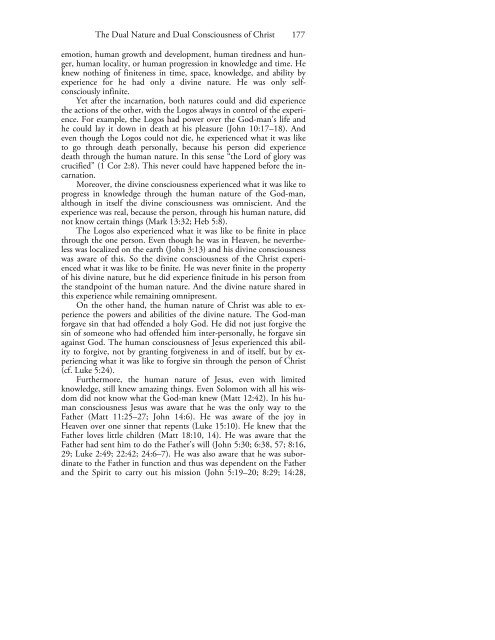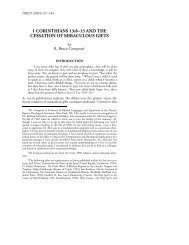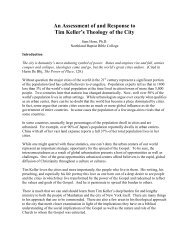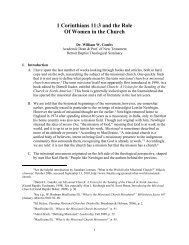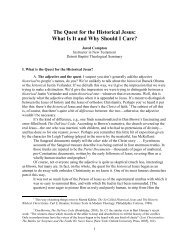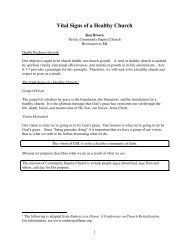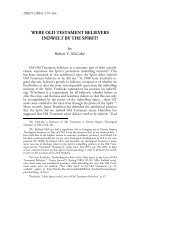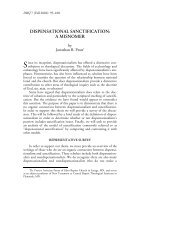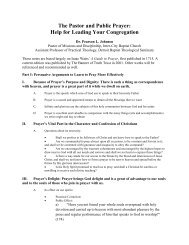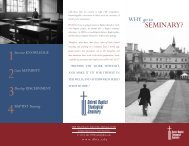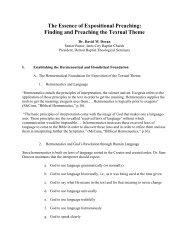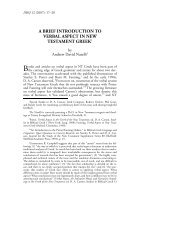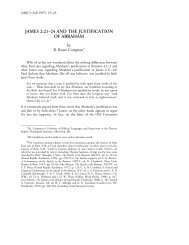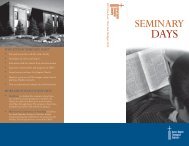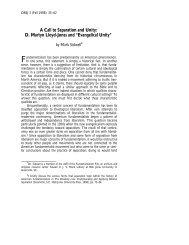Samuel A. Dawson - Detroit Baptist Theological Seminary
Samuel A. Dawson - Detroit Baptist Theological Seminary
Samuel A. Dawson - Detroit Baptist Theological Seminary
- No tags were found...
You also want an ePaper? Increase the reach of your titles
YUMPU automatically turns print PDFs into web optimized ePapers that Google loves.
The Dual Nature and Dual Consciousness of Christ 177emotion, human growth and development, human tiredness and hunger,human locality, or human progression in knowledge and time. Heknew nothing of finiteness in time, space, knowledge, and ability byexperience for he had only a divine nature. He was only selfconsciouslyinfinite.Yet after the incarnation, both natures could and did experiencethe actions of the other, with the Logos always in control of the experience.For example, the Logos had power over the God-man’s life andhe could lay it down in death at his pleasure (John 10:17–18). Andeven though the Logos could not die, he experienced what it was liketo go through death personally, because his person did experiencedeath through the human nature. In this sense “the Lord of glory wascrucified” (1 Cor 2:8). This never could have happened before the incarnation.Moreover, the divine consciousness experienced what it was like toprogress in knowledge through the human nature of the God-man,although in itself the divine consciousness was omniscient. And theexperience was real, because the person, through his human nature, didnot know certain things (Mark 13:32; Heb 5:8).The Logos also experienced what it was like to be finite in placethrough the one person. Even though he was in Heaven, he neverthelesswas localized on the earth (John 3:13) and his divine consciousnesswas aware of this. So the divine consciousness of the Christ experiencedwhat it was like to be finite. He was never finite in the propertyof his divine nature, but he did experience finitude in his person fromthe standpoint of the human nature. And the divine nature shared inthis experience while remaining omnipresent.On the other hand, the human nature of Christ was able to experiencethe powers and abilities of the divine nature. The God-manforgave sin that had offended a holy God. He did not just forgive thesin of someone who had offended him inter-personally, he forgave sinagainst God. The human consciousness of Jesus experienced this abilityto forgive, not by granting forgiveness in and of itself, but by experiencingwhat it was like to forgive sin through the person of Christ(cf. Luke 5:24).Furthermore, the human nature of Jesus, even with limitedknowledge, still knew amazing things. Even Solomon with all his wisdomdid not know what the God-man knew (Matt 12:42). In his humanconsciousness Jesus was aware that he was the only way to theFather (Matt 11:25–27; John 14:6). He was aware of the joy inHeaven over one sinner that repents (Luke 15:10). He knew that theFather loves little children (Matt 18:10, 14). He was aware that theFather had sent him to do the Father’s will (John 5:30; 6:38, 57; 8:16,29; Luke 2:49; 22:42; 24:6–7). He was also aware that he was subordinateto the Father in function and thus was dependent on the Fatherand the Spirit to carry out his mission (John 5:19–20; 8:29; 14:28,


